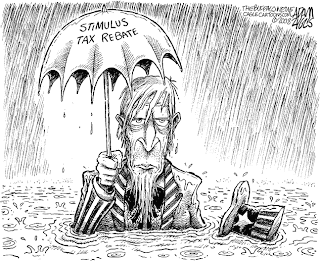Headline news from AP; “Dow up for a fourth day, turns positive for 2011”. But what changed from the beginning of August? Have we solved all the structural problems or have the sovereign debt crisis in Europe been solved? Or for that matter, have the capital adequacy requirements of the European banks been met? Nothing of that sort has happened and yet we have a mini bull run.
This Bull Run is based on few things:• Month end window dressing.• Hope that QE3 is coming.• Hope that Obama Administration will socialize the mortgage and housing mess and thus the insolvent banks will be saved.• Hope that some sort of stimulus package will be worked out.• The economic indicators and news are so bad that actually it is good news for the Banksters because it means more free money.
Any one of these hopes can materialize and the market can continue to go up to new heights but the timing does not seem right. If the market continues to go up, then the Fed will not inject liquidity. For that to happen, TPTB (The Powers That Be) have to create panic. So my wild guess is that we will see renewed volatility again and most likely the lows of August will be revisited or broken. Without that panic, they are not going to get more free money.
Hope is not a good investment strategy. Tomorrow being the 1st of the month, there will be lots of new fund allocation and possibly the last day of the prices going up till October. The sentiments have become overtly bullish and the put call ratio has reached a new high which is flashing red light. The COTS report is indicating that it is time to get back in cash. And possibly Gold will make a run for new high before the correction.
Headline news from AP; “Dow up for a fourth day, turns positive for 2011”. But what changed from the beginning of August? Have we solved all the structural problems or have the sovereign debt crisis in Europe been solved? Or for that matter, have the capital adequacy requirements of the European banks been met? Nothing of that sort has happened and yet we have a mini bull run.
This Bull Run is based on few things:
• Month end window dressing.
• Hope that QE3 is coming.
• Hope that Obama Administration will socialize the mortgage and housing mess and thus the insolvent banks will be saved.
• Hope that some sort of stimulus package will be worked out.
• The economic indicators and news are so bad that actually it is good news for the Banksters because it means more free money.
Any one of these hopes can materialize and the market can continue to go up to new heights but the timing does not seem right. If the market continues to go up, then the Fed will not inject liquidity. For that to happen, TPTB (The Powers That Be) have to create panic. So my wild guess is that we will see renewed volatility again and most likely the lows of August will be revisited or broken. Without that panic, they are not going to get more free money.
Hope is not a good investment strategy. Tomorrow being the 1st of the month, there will be lots of new fund allocation and possibly the last day of the prices going up till October. The sentiments have become overtly bullish and the put call ratio has reached a new high which is flashing red light. The COTS report is indicating that it is time to get back in cash. And possibly Gold will make a run for new high before the correction.




























